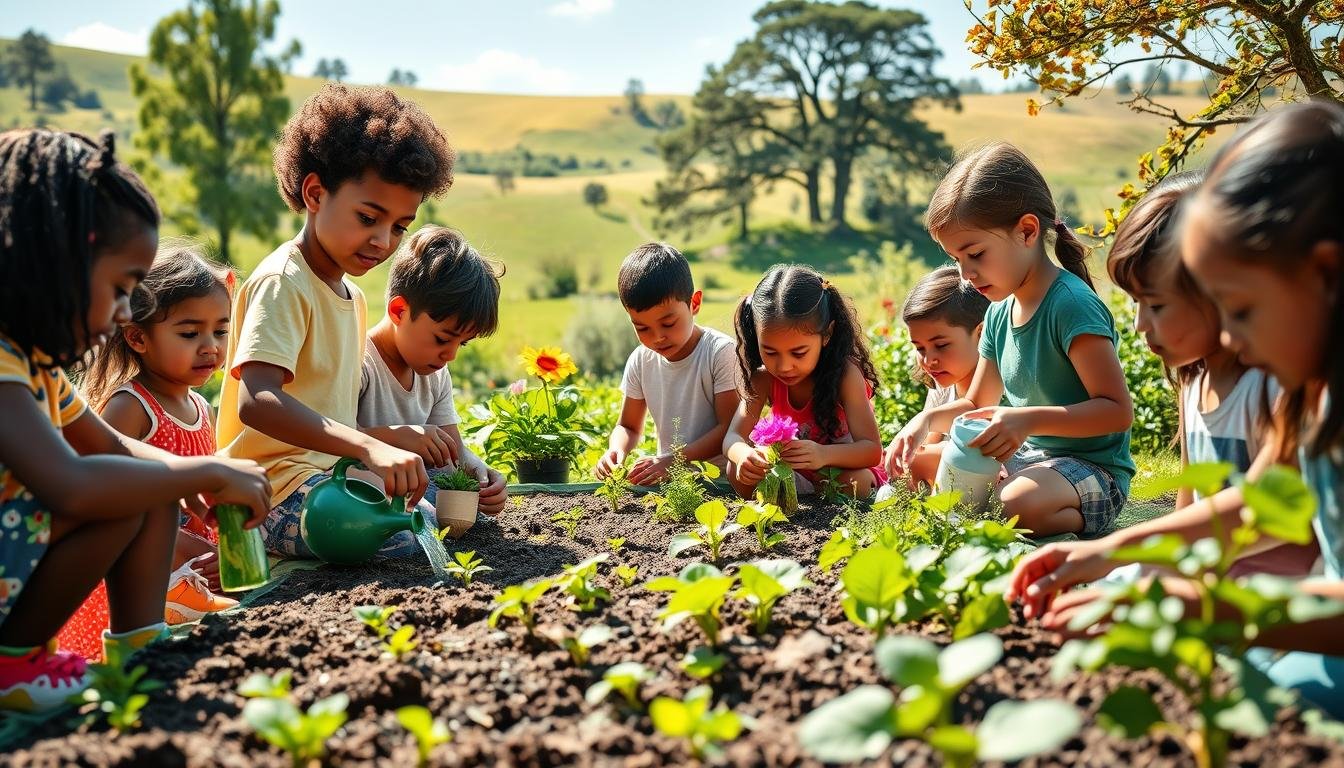Did you know kids who build complex structures might be future architects or engineers? Or those who daydream could have a big creative side, possibly leading to careers in the arts or problem-solving. Spotting your child’s talents early is a journey that could shape their future.
Every child has their own set of skills and strengths. It’s our job to see and help them grow. You, as a parent, can spot talents early, even before teachers or peers do. Watching how they play, talk, and learn gives clues about their talents. This could range from solving puzzles to leading others.
Helping your child’s talents grow can turn their natural abilities into skills. A young girl with autism who is now a tech leader shows how early support matters. You can help by mixing their activities across different areas. This is advised by Howard Gardner’s Theory of Multiple Intelligences encourage them to explore what they love and are good at.
A supportive home helps kids know themselves and boosts their confidence. It gives them the focus they need for a good life. Starting early to find and grow their talents is key. This could lead to success in sports, arts, or even becoming an inventor.
Seventy-five percent of experts think trying different activities is essential. This variety can reveal your child’s hidden talents. With your support, they can make a big impact. Remember, your child has endless potential to shine in their unique way.
Understanding Your Child’s Unique Attributes
Noticing your child’s special talents is like taking care of a seed. It needs patience, close watching, and the right environment to grow. This caring helps us see and support their natural abilities. In turn, this helps them grow into well-balanced people.
Understanding each child’s uniqueness is key. Some kids show their special talents early. Others show their skills in quieter ways. Watching your child interact with the world can show their natural talents. It might be through organizing, storytelling, or moving energetically.
This approach isn’t just about getting good grades or winning sports. It’s about seeing who they truly are and helping them reach their full potential.
- Gifted children might show amazing skills early on, like advanced talking or solving puzzles.
- Children who are natural leaders might do great in groups, understanding and handling complicated social situations well.
- A child filled with curiosity might always be exploring and asking questions, turning every moment into something they can learn from.
- Kids who love being active could be great in sports or dance, showing early talent for movement and coordination.
Supporting their talents means seeing not just where they’re strong but also where they might need help. For example, a very smart child might find it hard to make friends. Our job is to help them grow in every way, balancing their talents and social skills.
Nurturing talents is a journey. As kids grow, their interests and skills will change. Keeping an environment that pushes them but also supports their needs is key. This long-term support turns their natural abilities into skills they’ll have for life, helping them have a happy, rich future.
By spending time and resources on understanding and helping our kids’ unique qualities, we build a solid base for their growth. This helps them now and gives them tools to face challenges later with creativity and strength.
Observational Techniques to Identify Potential
Being keen observers lets us spot our children’s hidden talents. It’s crucial to watch their behaviors closely. This way, we can see clues about their abilities. Whether it’s thinking, moving, or creating, we can discover what they’re good at. Applying these observations helps us find and nurture their talents.
Watching how kids engage with things around them is enlightening. Maybe sorting objects shows they’re good at analyzing. Constant chatter might mean they’re verbally talented. Taking apart toys could indicate mechanical skills. Keep an eye on such behaviors. They might show a child’s talents or skills.
- Engage directly with your child by discussing their favorite activities. Ask what they enjoy most and probe into reasons that certain activities attract them. This conversation can reveal what naturally energizes or motivates them.
- Incorporate feedback from adults who interact with your child in different environments. Teachers, coaches, and caregivers can offer unique perspectives that you might overlook. They can observe your child in social settings and during structured activities, which can further aid in spotting latent talents.
- Monitor physical activities as they can be telling of bodily-kinesthetic intelligence. If your child is always moving, running, or jumping, they might excel in physical endeavors or sports.

Making a space for kids to be themselves is vital. Let them try different things freely. This approach helps in identifying their talents. It also shows us what they like and are good at. Be on the lookout for steady interests or hobbies. Offer them the resources to grow these interests.
The essence of spotting talent in kids is gentle, yet active involvement. Using these observational methods places us in a better position. We can then support our children to achieve their best, enhancing their unique talents.
How to Spot Hidden Talents
Finding hidden talents in children starts with careful watching and staying open to new possibilities. As parents and caregivers, we should push them towards different areas like creative arts or sports. This helps spot skills that aren’t fully seen.
Simple actions in kids often show big abilities. A child who talks a lot could be great at languages or telling stories. This isn’t just a habit, but maybe a special talent. Daydreaming kids may hold the seed of creativity. They just need the right push to show their art or innovation skills.
It’s not about changing these behaviors. It’s about guiding them into growing talents. Making storytelling a part of family time can improve your child’s speaking skills. For a daydreamer, drawing or music allows them to express their inner thoughts.
Trying new things is key in finding talents. Letting your child test diverse activities highlights what they’re good and not good at. It helps spot their real talents. This could be a new sport, learning an instrument, or acting in a drama club. Each experience adds to their skills and likes.
Discovering talents means encouraging new things and supporting what they already like. Listening to your child’s favorite things is important. This approach helps them fully explore their abilities. It shapes their future, leading to happiness and success in their chosen paths.
Fostering a Growth Environment at Home
A child’s development thrives in a nurturing environment. The home is where this journey begins, shaping their future. Parents play a crucial role in this. They create spaces at home that foster talent and teach adaptive skills for children’s success.
Supportive family dynamics are key. When families back their children’s talents, growth follows. This might be a corner for books for a keen reader, or arts and crafts for the imaginative child. These spaces encourage a child’s deep dive into their passions.
- Construction toys for the budding builder
- Art supplies for the creative spirit
- Puzzles and riddles for the analytical thinker
Routines with varied learning styles matter too. Bedtime stories, for example, build literacy and comfort. They wrap up the day, mixing learning with emotional support.
Diverse experiences at home also spark new interests. Get children involved in cooking, gardening, or DIY projects. These not only build skills but enhance sensory experiences, crucial in early development.
Home is where children learn resilience and perseverance. Emphasizing home-based talent development teaches them the power of practice. This mindset fuels achievements in all areas of life.
Verbal affirmations and self-expression activities boost emotional development and talent. Through open communication and emotional support, supportive family dynamics build self-esteem and confidence.

In summary, parents can craft an ideal growth environment at home. This involves dedicated spaces, diverse materials, and strong emotional backing. It’s about making a safe, encouraging space where children explore and grow with their family’s support.
Nurturing and Expanding Your Child’s Abilities
As we travel through the journey of parenting, seeing our child’s talent grow is truly fulfilling. We spot early signs of potential and nourish them into achievements and confidence. Helping children grow their talents isn’t just about giving chances. It’s creating an environment that respects and boosts their natural skills. Every child has their own success path that we must understand and support.
Here’s how to effectively nurture and expand your child’s skills:
- Children are diverse: Not all academically gifted kids will excel in life otherwise. Creating opportunities in arts, sports, or leadership is essential.
- Encourage creativity without expecting anything in return: Urge them to be creative for the joy it brings. This fosters true passion over reward-seeking behavior.
- Promote resilience: Show them how to face challenges and not fear failure. It helps them become resilient and thrive through highs and lows.
- Be a role model: Showing interest in your hobbies and persisting in them inspires your kids.
- Offer various learning experiences: Both structured lessons and casual role-taking activities at home can enhance their skills and confidence.
By following these methods, you help not only in enhancing your child’s talents but also in their overall development into confident, skilled individuals.
| Statistic | Percentage |
|---|---|
| Parents who consider praising effort important for nurturing talent | 80% |
| Parents who provide resources based on child’s interests to cultivate talents | 60% |
| Parents who observe child’s activities to identify strengths | 70% |
These practices don’t just boost a child’s skills now but lay a foundation for future success. They ensure children not only excel in their strengths but also explore and develop new ones.
Conclusion
Parents and caregivers play a key role in unlocking a child’s potential. They must balance guidance with letting kids be themselves. This discussion highlights ways to spot and grow a child’s unique strengths. It covers observing their interactions and creating a supportive home environment. Steps like trying new things and tracking progress are crucial for child talent empowerment. These actions show our trust and hope for their futures.
Reflecting on advice from Oprah Winfrey and success stories shows the impact of supporting natural talents. It’s not just about discovering abilities; it’s about building lives filled with confidence, resilience, and happiness. At Kids Miracle Steps, we support your family on this path. Our programs are designed for children with special needs, aiming to develop their skills and self-esteem.
The journey to discover talents is continuous. It needs patience, insight, and flexibility. Being informed, getting feedback, and embracing lifelong learning are key. Celebrating every achievement values your child’s hard work and dedication. Visit us at Kids Miracle Steps for support in guiding your child towards a promising future. Together, we can highlight their special talents and skills.






